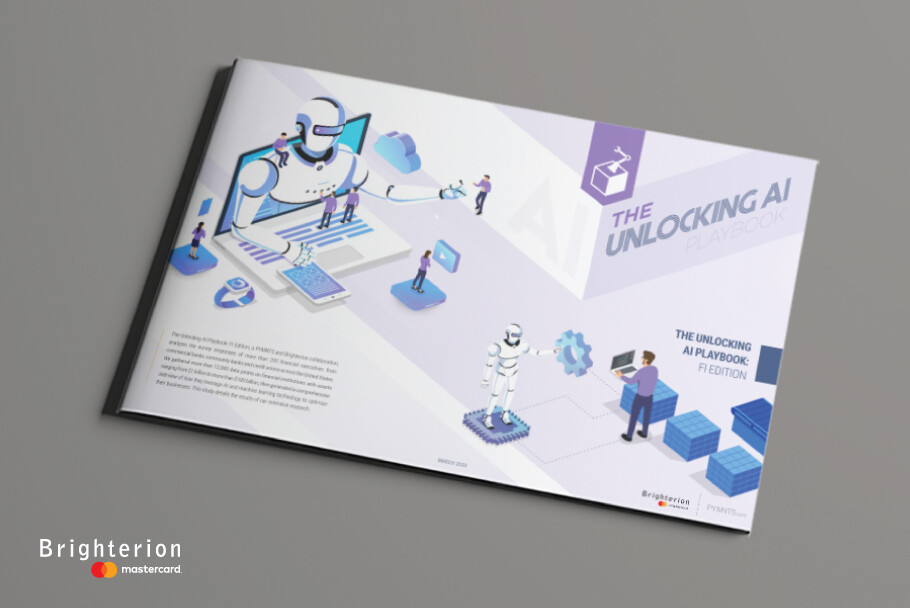Financial institutions are grappling with increasingly clever fraud schemes while still needing to provide seamless customer experiences. PYMNTS followed up on their 2018 interviews with 150 executives of leading U.S. banks and credit unions to ask how they are dealing with these demands. The unlocking AI playbook: FI edition gives a clear picture of how bankers currently use AI and their future plans.
In a little over a year, financial institutions have increased their use of artificial intelligence (AI), according to the latest research. Reported in The unlocking AI playbook: FI edition, PYMNTS analysts found that AI use is up 70 percent.
Here are the key findings:
-
FIs are using AI more and increasingly combating payments fraud with it.
Nine percent of banks use AI, up from 5.5 percent in 2018, marking a 69.7 percent year-over-year increase. Reduced payments fraud has emerged as a key AI advantage, and 21.4 percent of FIs using the technology cite it as the system’s most important benefit.
-
FIs believe AI’s real benefit is its ability to reduce manual review and exception processes.
There’s a significant size differential regarding AI use and investment. While 87.5 percent of banks with assets exceeding $100 billion report using AI, only 42.9 percent of those with assets between $25 billion and $100 billion report doing so. Just 3 percent of FIs with assets between $5 billion and $25 billion use such systems, and none with assets less than $5 billion use AI.
-
More than one-quarter of FIs – and an even greater share of larger banks – are highly interested in implementing Smart Agent-based AI.
Twenty-six percent of FIs are “very” or “extremely” interested in implementing AI that relies on Smart Agents that can be assigned to multiple entities within a system. Interest is exceptionally high among large FIs.
-
FIs are most interested in using Smart-Agent-based AI to address payments fraud, reduce manual review, and improve credit and portfolio risk assessment.
The three most important benefits cited by FIs interested in Smart-Agent–based AI are reducing payments fraud (reported by 27.2 percent), reducing manual review (24.3 percent) and improving credit and portfolio risk assessment (16.5 percent).
-
AI’s perceived lack of quantifiable benefits hinders its adoption, yet is seen as less limiting than others.
Over 57 percent of FIs uninterested in Smart Agent-based AI believe there’s a lack of measurable benefits. Others perceive the systems require “too much change” (19.1 percent) or are too costly for their benefits (12.8 percent).
The most common technologies used by FIs – and their results
Smart Agents represent an AI-based technology that creates virtual representations of every entity in a system and builds a profile from the entity’s activities. They enable Brighterion to draw upon the various AI tools to build a unique model specifically for each organization’s business goals.
The unlocking AI playbook also updates findings on the five most common technologies used by FIs: deep learning and neural networks, AI, business rule management, fuzzy logic, case-based reasoning and data mining. Year-over-year results show use of AI grew substantially, while more traditional or legacy systems are declining in use. Significantly, deep learning and neural networks (96.1 %) and AI with Smart Agents (69.7%) have been highly adopted. (Spoiler alert: only 5.0% of data mining users still believe their existing systems work just fine as they are!)
How to use The unlocking AI playbook
As consumer debt continues to rise in North America, FIs are looking for ways to predict and prevent credit delinquency. The unlocking AI playbook shows AI’s particular use for combating payments fraud, reducing manual review and improving credit risk. It analyzes various tools used by Fis and makes recommendations based on these use cases. Download it, have a read and let us know your thoughts.
The unlocking AI playbook: FI edition was researched and written by the analysts at PYMNTS.


